Top traders converge on Tulane for Energy Trading Competition
Student traders from Rutgers, the University of Texas at Austin, Tulane and Northwestern took the top honors at the 2010 Tulane Energy Trading Competition, but according to some participants, the biggest reward for taking part in the competition wasn’t the cash prizes or professional trading products awarded to the winners. It was the chance to rub shoulders with an all-star lineup of industry professionals.
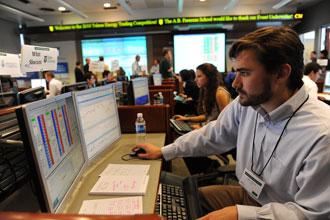
“You got to meet the people who actually do this for a living, and they got to see how you perform in real-world situations,” says Tulane MBA student Michael Grubbs, who placed fourth in the competition. “I met everybody from natural gas traders to industry executives to a scheduler at a refinery and got good-quality one-on-one contact with dozens of industry professionals. Hopefully, in the next few weeks, I’ll start getting some phone calls and we’ll see if we can turn this into a job offer.”
In just two years, the Tulane Energy Trading Competition has grown into one of the leading annual events for both students seeking careers in trading and energy executives seeking the best young talent. This year, 174 students from 33 universities took part in the remote round of the competition—more than twice the number of last year’s participants—and more than 40 industry executives attended the live final round and served as guest judges.
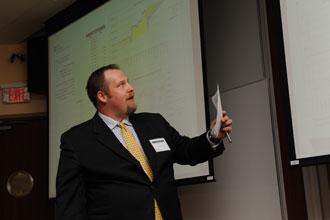
“The growth of the competition, both in terms of student interest and industry participation, speaks volumes about its quality,” says Joe LeBlanc, professor of practice at Tulane’s Freeman School of Business and organizer of the competition. “Students are eager to demonstrate their skills in a real-world trading environment, and industry executives are interested in seeing firsthand how potential recruits handle the pressures and manage risk.”
The final round of the competition took place on Saturday (Oct. 23) in the Freeman School’s Trading Center, a state-of-the-art simulated trading floor equipped with industry-leading software, hardware and analytical tools from the CME Group, Trading Technologies, Thomson Reuters and LIM. Over the course of one extraordinarily intense day, the top 28 students from the remote round put their skills to the test trading live natural gas futures and refinery crack spreads using a proprietary simulation that industry professionals call the most realistic energy-trading exercise available in a university setting.
Tulane’s energy trading competition is unique for its strong emphasis on risk management and responsible trading. While other competitions determine prize winners solely on the basis of profits and losses, Tulane ranks participants according to risk-adjusted PnL and puts the ultimate decision in the hands of a panel of judges, industry experts charged with critically assessing the quality of the students’ strategies and how they handle the pressure.
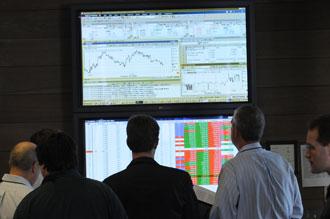
“I wasn’t necessarily looking for the person who made the most money,” explains Berney Aucoin, a vice president with Sequent Energy Management, who served as one of this year’s judges. “I was looking for someone who made money but also managed risk accordingly and demonstrated the ability to critically think through situations they weren’t prepared for. Getting into the students’ heads and understanding their critical thinking process was really enlightening.”
“It was one of the best, most realistic simulations I’ve ever seen,” adds competition judge Mike Henson, manager of infrastructure strategy with Chevron Products Co. “It was intense and focused, and that’s exactly the way life is out on the trading desk. Seeing how the students dealt with the pressure was just incredibly dynamic.”
This year, the competition added a new wrinkle to its trading sessions with the judges taking on the position of heating oil buyers in the refinery crack spread session and actively participating in the market.
“Having the judges trade with the students added more volatility to the market, and volatility is a trader’s best friend,” says Steve Landry, senior vice president at Marathon Oil, another of this year’s judges. “Volatility creates opportunities for the students, and we as judges were able to see how they responded to that volatility, so I think it was a great idea.”
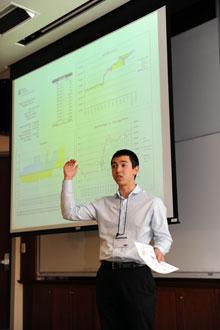
Rutgers University student Rodrigo Polezel, who won first place in this year’s event, says the competition’s use of the Tulane Energy Risk Index—which penalized students who took on excessive risk—helped to make the trading sessions more representative of the real world.
“In real life, if you lose more than 5 percent of your capital, you’re going to get fired, and that’s what this competition showed you,” Polezel says. “The index definitely made me be more aware of my risks.”
In addition to Polezel, the top three finishers also included Robert Ettinger of the University of Texas at Austin, who earned second-place honors, and Alex Santos of Rutgers, who won third place.
Each of the three top finishers received a prize package valued at nearly $100,0000, including cash prizes ranging from $500 to $1,500, a one-year license for Thomson Reuters Eikon, a one-year license for LIM’s MIMIC and XMIM software, and a one-year license for the Imagine Trading System.
For finishing fourth and fifth in the competition, Grubbs and Northwestern University student Rory Sandstrom each received a one-year license for Thomson Reuters Eikon and LIM’s MIMIC and XMIM software.
The 2010 Tulane Energy Trading Competition was underwritten by the CME Group and sponsored by Trading Technologies, Thomson Reuters, LIM, Imagine Software, Entergy, Global Association of Risk Professionals (GARP), Mirant, Sequent Energy and Accenture.
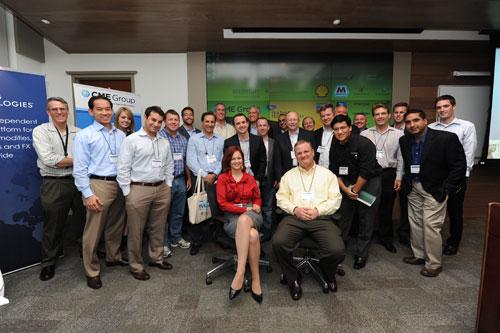
For more information about the competition and the complete list of winners, visit http://freeman.tulane.edu/trading/
To see more photos from the competition, visit the Freeman School’s Flickr page.
Interested in advancing your education and/or career? Learn more about Freeman’s wide range of graduate and undergraduate programs. Find the right program for you.
Other Related Articles
- Politico: Trump administration moves closer to opening Venezuela to more US oil producers
- Alumna leverages Freeman network to land dream job at Entergy
- Quartz: What it would take for Trump to drag Big Oil back into Venezuela
- Harvard Business Review: Why AI Boosts Creativity for Some Employees but Not Others
- Forbes: How To Talk Politics With Family Over The Holiday
- AI-powered fund takes top prize in Aaron Selber Jr. Hedge Fund Course
- De Franco appointed Keehn Berry Chair of Banking and Finance
- The Wall Street Journal: For Trump, the Warner Megadeal Talks Are All About CNN
